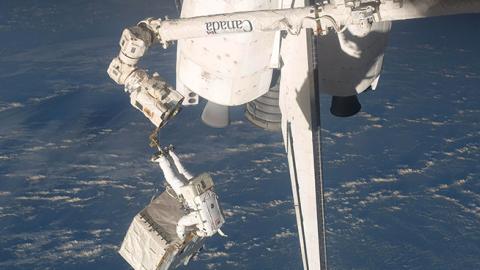President Donald Trump’s plan to create a U.S. Space Force would require a multiyear reorganization of military operations, with potential spillover effects on existing partnerships that involve Canada.
Canada is watching and evaluating whether NORAD — the joint Canada-U.S. command defending North American air space — or the terms of Canada’s cooperation with U.S. Strategic Command will need updating.
Any changes to these structures could prompt debates within Canada about the weaponization of space, as occurred a decade ago over ballistic missile defense.
Trump hopes to have the new military branch in place by 2020 and has said it’s not enough to have an American presence in space, but that the new goal is “dominance in space."
Vice President Mike Pence, who is overseeing the effort, said in a speech that the administration plans to create a new Space Command, Space Operations Force, Space Development Agency and an assistant secretary of Defense for space.
Among U.S.-Canada space operations, those under STRATCOM could be the most impacted because the space war-fighting mission it currently serves would be transferred to the new U.S. Space Command, experts say.
This military reshuffling is occurring in tandem with larger shakeups in commercial and civil space that include a return to the moon. NASA is seeking international partners for the Lunar Orbital Platform-Gateway, a space station that will orbit the moon and carry out surface missions; stakeholders are anxiously awaiting Canada’s confirmation of its participation in the gateway.
If Space Force is approved by Congress, it would be the first new military branch since the establishment of the Air Force in 1947.
The Pentagon is moving ahead with the development of a Space Operations Force, but congressional approval is required to establish a new branch of the military and the White House still faces bipartisan skepticism in Congress, particularly in the Senate
For now, Canada is watching Trump’s next moves.
Tom Lawson, Canada’s former chief of defense staff for the Canadian Armed Forces and deputy commander for NORAD, has dismissed the creation of a Canadian space force counterpart. He said in June that Canada should monitor developments with the proposed U.S. Space Force, remain closely linked with U.S space agencies and, from that, continue to learn and contribute.
Ottawa is also waiting to see whether Washington will ask for contributions to space-based defenses — a proposition that would likely spark a political debate.
“Canada needs to have a national discussion on the potential future missions for the Space Force,” said Dr. Brian Weeden, director of program planning for Secure World Foundation.
He also called for “a dialogue with the U.S. and the rest of the alliance partners on what the U.S. space capability needs are and which of those Canada can contribute to.”
Currently, the U.S. Department of Defense has space-related capabilities under several different commands.
Consolidating these under a new organizational structure will require a significant reorganization of the Pentagon’s space operations, impacting many current international defense partnerships and alliance structures.
NORAD, which relies on space-based capabilities, may experience minimal impacts on its command. “NORAD is primarily a customer of missile warning and [space situational awareness] data to support its mission, and although the organization providing that data might change with the creation of a Space Force, I don't see it having that big of an effect on NORAD itself,” Weeden said.
Yet any adjustment in its role could draw Canada into the space-force debates.
NORAD is a binational command, so any change to the agreement requires the consent of both countries, said Andrea Charron, director of the Centre for Defence and Security Studies at the University of Manitoba.
NORAD’s current mission includes aerospace warning, aerospace control and maritime warning.
“NORAD has the mandate to warn of any aerospace threats,” such as ballistic missiles, “but not deep into space, and there is still an artificial separation between air, aerospace and space in terms of what assets can operate where,” Charron said.
Many major space-based operations between the two countries, including some originally handled under NORAD, operate within U.S. Strategic Command.
In 2014, Canada and the U.S., along with the United Kingdom and Australia, signed the Combined Space Operations Initiative, a memorandum of understanding designed to strengthen deterrence, resilience and resources for military-to-military space operations.
This built upon a Space Situational Awareness agreement signed between U.S. Strategic Command and Canada’s Department of National Defence to increase data-sharing to enhance space flight safety.
“Canada needs to stay engaged with the U.S. on the transition of the [Joint Space Operations Center] JSpOC to the [Combined Space Operations Center] CSpOC and how Canada will integrate into the CSpOC,” Weeden said.
Canadian political leaders have hailed cooperation with the United States in exploration and scientific research in space, but they have also held a long-standing position that Canadians would not support the weaponization of space.
This debate first arose with the U.S. Strategic Defense Initiative, also known as “Star Wars,” which was announced in 1983 by then-President Ronald Reagan.
Using space-based assets, the initiative proposed a missile-defense shield around North America intended to prevent Soviet Union nuclear ballistic missiles from reaching U.S. soil. A generation later, in the 2000s, Canada also opposed participation the U.S. Ballistic Missile Defense system.
Michael Byers, the Canada research chair in global politics and international law at the University of British Columbia, suggests that the Space Force proposal will be different from past proposals.
Byers believes the Space Force will focus on noncombat capabilities, such as electronic warfare against satellites.
While the U.S. moves ahead with its Space Force plans, it may be too soon to warrant a Canadian response, Charron said.
“For now, I would suggest that Canada not make any precipitous decisions,” she said.
“We are not entirely certain [of] the [details] of the Space Force and so I would advise the Canadian government to simply monitor developments.”



















